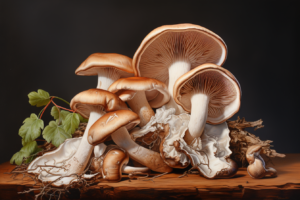L-Theanine, an amino acid found naturally in tea leaves, has gained popularity recently as a supplement for reducing stress and increasing relaxation. However, some people may find that they need to increase their consumption of L-Theanine quickly for maximum benefits. Whether you are looking to reduce anxiety or improve your sleep quality, this article will provide tips and strategies on how to increase your intake of L-Theanine efficiently. From natural sources like tea and mushrooms to supplements and extracts, we’ll explore all the options available to help boost your daily dose of this beneficial compound.
Natural Sources of L-Theanine: Tea and Beyond
Natural sources of L-Theanine include tea and other related products, including green tea, black tea, oolong tea, white tea, and matcha. The amount of L-Theanine varies in these teas depending on the growing conditions and how they are processed. For example, shade-growing methods can increase the levels of L-Theanine compared to teas grown under full sunlight. In addition to tea leaves, mushrooms such as Xerocomus badius and Boletus badius also contain significant amounts of L-Theanine.

If you are looking for ways to increase your L-Theanine intake quickly or don’t have access to natural sources like fresh mushrooms or high-quality teas consistently, supplements may be an option. There are various forms available such as capsules or powder that you could add into beverages like smoothies for an easy-to-use approach.
It is still important to remember that supplementing should not replace a healthy diet but rather complement it when needed.
In summary, natural sources like different types of teas along with some mushrooms offer us a way to fill our daily requirement of l-theanine naturally while promoting health benefits.
However taking supplements can provide additional support if needed( either temporary-wise or as part in conjunction with a regular balanced diet).
The Magic of Matcha: A High L-Theanine Tea
Matcha tea, a high-quality green tea powder traditionally grown and produced in Japan, is known for its unique ability to increase L-Theanine intake quickly. Matcha contains unusually high levels of L-Theanine compared to other teas because it is shaded from the sun while growing which increases its amino acid content. The unique preparation method involves grinding the entire tea leaf into a fine powder allowing people who drink matcha to consume 100% of the leaves, including all their health benefits. This makes matcha an excellent choice for those looking for a natural way to boost their daily dose of L-Theanine.
The Magic of Matcha extends beyond just boosting cognitive function as it also has been said to contain powerful antioxidants that protect against disease and inflammation. In addition, its calming properties have made it popular among individuals with anxiety or depression; studies have shown that consuming matcha can promote relaxation without causing drowsiness. Overall, incorporating matcha into your diet could be an excellent way to maximize the benefits of L-Theanine efficiently while enjoying highly concentrated green tea flavor alongside numerous beneficial compounds that offer additional health values beyond stress reductions.
Exploring L-Theanine Supplements: What to Look For
When exploring L-Theanine supplements, there are a few key things to look for. First and foremost, it is important to choose a reputable brand with high-quality ingredients. Look for supplements that are third-party tested and certified to ensure purity and potency.
Another factor to consider is the dosage. While L-Theanine is generally considered safe even at higher doses, starting with a lower dose and gradually increasing can help you determine your personal tolerance level without risking any side effects.
If you prefer natural sources of L-Theanine over supplements, green tea is an excellent option as it contains significant amounts of this amino acid. Additionally, certain types of mushrooms such as shiitake and oyster mushrooms also contain notable levels of L-Theanine.
Ultimately, finding the right source and dosage of L-Theanine will depend on individual needs and preferences. As with any supplement or dietary change, it’s always best to consult with a healthcare professional before making significant adjustments in your diet or lifestyle routine.
The Power of L-Theanine Extracts: Benefits and Risks
L-Theanine is widely known for its stress-reducing and relaxation-promoting properties. This amino acid stimulates the production of alpha brain waves which enhance focus and mental clarity while inducing a sense of calmness. The benefits of L-Theanine extract include improved cognitive performance, reduced anxiety levels, enhanced sleep quality, and increased immune system function. It also acts as a natural neuroprotective agent helping to prevent age-related memory loss symptoms.
 Despite its numerous health advantages, L-Theanine supplements aren’t without their risks. Excessive consumption may lead to mild side effects such as headaches or nausea, especially in those with sensitive stomachs. Moreover, the synthetic extracts contain additives that could cause allergic reactions or interact with other medications negatively.
Despite its numerous health advantages, L-Theanine supplements aren’t without their risks. Excessive consumption may lead to mild side effects such as headaches or nausea, especially in those with sensitive stomachs. Moreover, the synthetic extracts contain additives that could cause allergic reactions or interact with other medications negatively.
Therefore it’s vital to consult your doctor before incorporating any L-Theanine supplement into your diet regimen and stick to recommended dosages strictly.
L-Theanine-Rich Foods: Mushrooms, Seaweed, and More
L-Theanine-rich foods offer a natural way to increase your intake of this amino acid, which may help relieve stress and promote relaxation. One of the best sources of L-Theanine is tea, particularly green tea and matcha. However, if you’re not a fan of these beverages or are looking for alternative sources, mushrooms such as shiitake and oyster mushrooms can also be a good option.
Seaweed is another L-Theanine-rich food that can easily be added to your diet. Nori sheets used in sushi rolls are particularly high in L-Theanine. Spinach and broccoli are also known to contain small amounts of this amino acid.
If you’re looking for quick ways to boost your L-Theanine intake even further, supplements and extracts are readily available on the market. However, it’s important to consult with a healthcare professional before adding any new supplement to your routine.
Combining L-Theanine with Other Supplements: Dos and Don’ts
Combining L-Theanine with other supplements can enhance its effectiveness for some people. However, it is important to proceed with caution and follow certain guidelines when doing so. One of the safest and most effective ways to increase your intake of L-Theanine is by combining it with caffeine. This combination has been shown to improve cognitive function, attention, and alertness while reducing mental fatigue.
Another supplement that complements the benefits of L-Theanine is Melatonin. When taken together before bedtime, they can help promote relaxation and reduce anxiety levels, leading to better sleep quality overall. However, it’s essential not to exceed recommended dosage levels as each person may have a different reaction due to their unique physiology or existing health conditions.
Ultimately, combining L-Theanine with other supplements should be done under medical supervision or after consulting a healthcare professional if you are unsure about dosage or interactions with any prescription medications you’re taking. With careful consideration and proper usage, incorporating multiple supplements alongside daily doses of L-Theanine could potentially lead to optimal health outcomes for those seeking an all-natural approach towards improving stress management or getting restful sleep at night.

Tips for Incorporating L-Theanine into Your Daily Routine
Incorporating L-Theanine into your daily routine is a simple and effective way to improve mental focus, mood, and overall well-being. To start with, you can consume tea made from the Camellia sinensis plant that contains high levels of L-Theanine. There are several varieties of tea available including green tea, white tea or black Tea that have differing levels of L-theanine content.
Another way is taking supplements in pill or capsule form as they contain higher doses of the amino acid compared to drinking tea. It’s also possible to find combination supplements which come with both caffeine (for energy) and L-Theanine (to reduce jitters). Beginning with small dosages it’s always good practice when experimenting with new supplements; following up specific guidelines regarding supplementation amount will make certain safety measures are in place while benefits take place.
Lastly, consider consuming foods containing mushroom extract since species like shiitake mushrooms include significant amounts of this amino acid naturally invested within them such substances may provide additional nutrition too. Carefully adding those into meals during mealtimes throughout each day serves as another viable method for gradually increasing regular consumption over time thereby enjoying various benefits associated with ever-increasing serenity at mind while going about daily life responsibilities- without making changes drastically overnight!
To Summarize:
Research suggests that L-theanine, a functional food additive found in green tea and some mushrooms, can significantly enhance cognitive function and help with anxiety disorders. The effects of theanine, especially in combination with caffeine, have been studied extensively. It has been found that L-theanine relieves positive symptoms in patients with schizophrenia and schizoaffective disorder and may also improve attention deficit hyperactivity disorder (ADHD). Evidence that L-theanine may improve poor sleep and induce a good night’s sleep has been identified in tea research.

When you choose to use L-theanine, it’s best to consider the appropriate dosage. Consuming 50 mg per day can increase alpha waves in the brain, while doses of 200-400 mg, particularly 200 mg of L-theanine, have shown promising results. Although L-theanine is safe, it’s advisable to consult with a healthcare professional before starting theanine supplementation, especially if you are on medications that lower blood pressure.
This is because L-theanine can improve the body’s response to physical and psychological stresses, potentially causing changes in blood pressure. The effects of caffeine and theanine on blood pressure under physical and psychological stress have been well-documented.
One study found that a combination of 200 mg of L-theanine and 50 mg of caffeine could effectively manage caffeine intake on changes in blood pressure. The way that L-theanine works to balance the stimulating effects of caffeine has made it a popular choice in supplement form.
In conclusion, theanine supplements, whether as green and black tea or in a form of L-theanine supplement, offer a range of potential health benefits. L-theanine has been shown to improve sleep quality, relieve anxiety in people, and possibly offer positive effects on mental health disorders. From the calming effects of tea constituents L-theanine and green tea catechins, to the administration of cystine and theanine, L-theanine benefits are wide and varied.
Help Section:
Q: What is L-Theanine and how does it work?
A: L-Theanine is an amino acid found in tea leaves and some mushrooms. It works by increasing the levels of GABA, serotonin, and dopamine in the brain, thereby promoting relaxation and reducing stress and anxiety.
Q: What are the benefits of taking L-Theanine?
A: L-Theanine may help lower blood pressure, improve sleep quality, reduce stress and anxiety, and enhance cognitive function. It may also reduce the stimulating effects of caffeine and improve mood.
Q: Is L-Theanine safe?
A: L-Theanine is considered safe when taken in recommended doses. However, high doses may cause side effects such as headaches, dizziness, and gastrointestinal problems.
Q: What is the recommended dose of L-Theanine?
A: The recommended dose of L-Theanine is typically between 100-400 mg per day, depending on the desired effects.
Q: Can L-Theanine be taken with caffeine?
A: Yes, L-Theanine and caffeine can be taken together for a synergistic effect. L-Theanine can help reduce the stimulating effects of caffeine and improve overall cognitive function.
Q: What are the risks and side effects of taking L-Theanine?
A: While generally safe, high doses of L-Theanine may cause side effects such as headaches, dizziness, and gastrointestinal problems. It may also interact with certain medications, so it’s important to consult with a healthcare provider before taking L-Theanine supplements.
Q: How can L-Theanine help with sleep?
A: L-Theanine may help improve sleep quality by reducing stress and anxiety and promoting relaxation. It may also improve overall cognitive function and mood, leading to better sleep patterns.
Q: Where can I find L-Theanine?
A: L-Theanine is found naturally in tea leaves and some mushrooms. It is also available in supplement form and can be purchased at health food stores or online.
Q: How long does it take for L-Theanine to work?
A: The effects of L-Theanine may be felt within 30-60 minutes of taking it. However, the optimal timing and duration of L-Theanine supplementation may vary depending on the desired effects and individual response.
Q: Can L-Theanine be used to treat anxiety?
A: While not a substitute for prescribed anxiety medication, L-Theanine may help reduce stress and anxiety and promote relaxation through its effects on neurotransmitters such as GABA, serotonin, and dopamine.



 L-Theanine Dosage – Recommended Daily Intake
L-Theanine Dosage – Recommended Daily Intake
